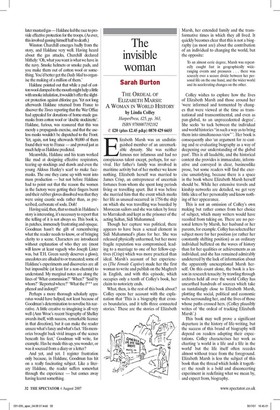The invisible woman
Sarah Burton THE ORDEAL OF ELIZABETH MARSH: A WOMAN IN WORLD HISTORY by Linda Colley HaiperPress, £25, pp. 363, ISBN 9780007192182 © £20 (plus £2.45 p&p) 0870 429 6655 Elizabeth Marsh was an undistinguished member of an unremarkable dynasty. She was neither famous nor infamous and had no conspicuous talent except, perhaps, for survival. Her father's family was involved in maritime activity but of her mother we know nothing. Elizabeth herself was married to James Crisp, an entrepreneur of uncertain fortunes from whom she spent long periods living or travelling apart. But it was before she married him that the event which marks her life as unusual occurred: in 1756 the ship on which she was travelling was boarded by Moroccan sailors and she was taken by force to Marrakesh and kept as the prisoner of the acting Sultan, Sidi Muhammed.
Though her capture was political, there appears to have been a sexual element in Sidi Muhammed's plans for her. She was released physically unharmed, but her more fragile reputation was compromised, leading to a marriage to one of her fellow-captives (Crisp) which was more practical than ideal. Marsh's account of her experiences (The Female Captive) made her the first woman to write and publish on the Maghreb in English, and with this episode, which occupies only a tenth of Colley's book, her claim to notoriety ends.
What, then, is the rest of this book about? Colley opens her account with the explanation that 'This is a biography that crosses boundaries, and it tells three connected stories.' These are the stories of Elizabeth Marsh, her extended family and the transformative times in which they all lived. It quickly becomes clear that this is not a biography (as most are) about the contribution of an individual to changing the world, but the opposite: To an almost eerie degree, Marsh was repeatedly caught fast in geographically wideranging events and pressures . . . there was scarcely ever a secure divide between her personal life on the one hand, and the wider world and its accelerating changes on the other.
Colley wishes to explore how the lives of Elizabeth Marsh and those around her 'were informed and tormented by changes that were viewed at the time as transnational and transcontinental, and even as pan-global, to an unprecedented degree'. She seeks 'to tack between the individual and world histories "in such a way as to bring them into simultaneous view" '. Her book is consequently also 'an argument for re-casting and re-evaluating biography as a way of deepening our understanding of the global past'. This is all laudable, and the historical context she provides is immaculate, informative and conveyed in clear, businesslike prose, but some readers will find the exercise unsatisfying, because there is a space in the book where Elizabeth Marsh herself should be. While her extensive travels and kinship networks are detailed, we get very little idea of her personality and know nothing of her appearance.
This is not an omission of Colley's own making but rather comes from her choice of subject, which many writers would have recoiled from taking on. There are no personal letters by Marsh, her husband or her parents, for example. Colley has selected her subject more for her position (or rather her constantly shifting position) as an ordinary individual buffeted on the waves of history than for her qualities or achievements as an individual, and she has remained admirably undeterred by the lack of information about the apparently unexceptional Marsh herself. On this count alone, the book is a lesson in research tenacity: by trawling through archives held all over the world Colley has unearthed hundreds of sources which take us tantalisingly close to Elizabeth Marsh, plotting the social, political and economic webs surrounding her, and the lives of those whose paths crossed hers. (Colley plausibly writes of 'the ordeal of tracking Elizabeth Marsh'.) This book may well prove a significant departure in the history of life-writing, but the success of this brand of biography will depend on readers adapting their expectations. Colley characterises her work as charting 'a world in a life and a life in the world' but the life itself often recedes almost without trace from the foreground. Elizabeth Marsh is less the subject of this book than the thread which holds it together: the result is a bold and disconcerting experiment in redefining what we mean by, and expect from, biography.








































 Previous page
Previous page